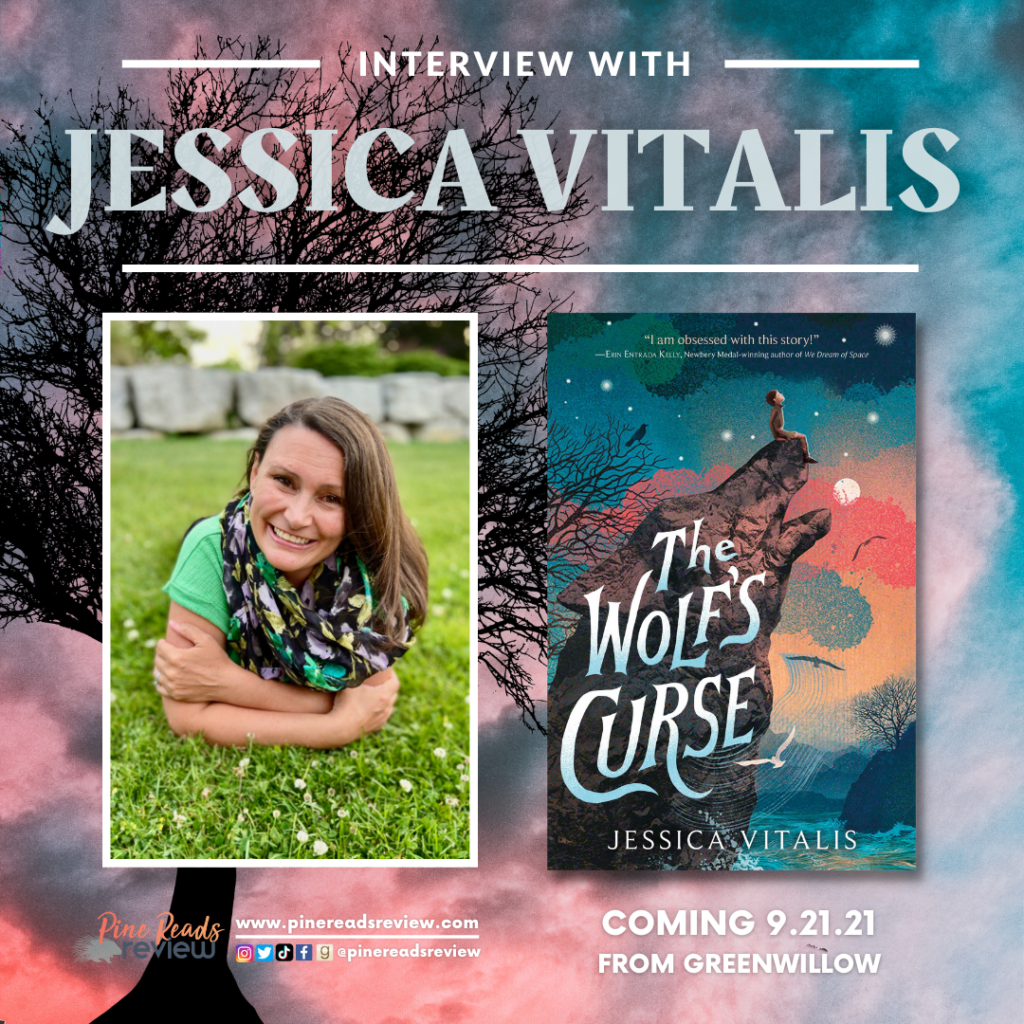
About the Author: “Jessica Vitalis is a Columbia MBA-wielding writer. After leaving home at 16, Vitalis explored several careers before turning her talents to middle grade literature. She brings her experience growing up in a nontraditional childhood to her stories, exploring themes such as death and grief, domestic violence, and socio-economic disparities. With a mission to write entertaining and thought-provoking literature, she often includes magic and fantastical settings. As an active volunteer in the kidlit community, she’s also passionate about using her privilege to lift up other voices. In addition to volunteering with We Need Diverse Books and Pitch Wars, she founded Magic in the Middle, a series of free monthly recorded book talks, to help educators introduce young readers to new stories. She was recently named a 2021 Canada Council of the Arts Grant Recipient. An American expat, she now lives in Canada with her husband and two precocious daughters. She loves traveling, sailing and scuba diving, but when she’s at home, she can usually be found reading a book or changing the batteries in her heated socks.” (Bio and headshot sent by publicist)
Find Jessica Vitalis on the following platforms:
Jessica Vitalis: Thank you for having me! The Wolf’s Curse is set in a French-inspired seaside village and features a Great White Wolf that has spent the last 700 years searching for someone to take her job. She’s set her sights on a twelve-year-old boy named Gauge, but he has been labeled a Voyant, or witch, by the superstitious villagers for his ability to see the invisible Wolf. When he catches her stealing his beloved grandpapá’s soul, he joins forces with another orphan to avenge his grandpapá and clear his name. The two navigate their shared grief in a life-changing journey that reveals surprising truths about the Wolf––and about death.
JV: The Wolf’s Curse was inspired by Markus Zusak’s The Book Thief; I love his use of Death as a narrator, and I wanted to use this same approach to create a story that was more accessible for middle grade readers. Writing with an omniscient narrator in present tense was definitely a challenge; I spent a lot of time reading other stories with omniscient narrators to figure out how to make it work. In terms of research, I also studied death rituals from around the world; I wanted to be careful not to appropriate any of them, but the understanding that there are many different beliefs about death and the afterlife helped me create a set of rituals organic to my story world. (For example, in The Wolf’s Curse, the villagers believe that stars are actually lanterns lit by their loved ones after they journey to the Sea-in-the-Sky to sail into eternity.)
JV: I’ve always been a writer, but I pursued a career in business, and it wasn’t until later in life that I realized writing was my true passion. Even after setting my sights on becoming a published author, success didn’t come quickly; I wrote six books over the course of thirteen years before landing my first book deal. This was partly because I was raising young children and managing various life challenges, but also because it took me several years to translate my writing skills into learning how to write a compelling novel.
JV: I think all too often, we idealize childhood as a place where we’re not yet troubled by the burdens of adulthood. Certainly that has changed to some extent due to the events of the last couple of years, but the reality is that even before Covid-19, there were school shootings. And even if our children haven’t lost someone they know or love, the fact is that death is a natural part of life. Books about grief can create safe spaces for kids to process their emotions and provide a model for hope and healing when they finally encounter heartbreak. It’s my hope that tackling this subject in a fantastical setting will help break down some of the fear and reluctance that can hamper discussions about death and the afterlife.
JV: Writing with the wolf’s voice was the most fun I’ve ever had in my writing journey. Her voice came to me with the prologue that opens the story and she pretty much just guided the story from that point on. The difficult part was trying to balance her snarky asides so that they didn’t take over or disrupt the flow of the text to the point where it frustrated the reader.
JV: The very last scene in the book was probably one of my favorites to write—I wrote it very late in the process, after the story had been through my beta readers and right before I was about to start querying. I don’t want to give away any spoilers, but it really felt like it was needed to wrap the whole story up. The opening scene between Gauge and his grandpapá was definitely the most difficult to write. Not from a plot perspective, but because I had so many decisions to make about whose POV I wanted to use at any given time and how to create a real emotional connection between Gauge and his grandpapá so that readers really understand their relationship. That said, it was also really fun to write because I got to introduce the reader to the Wolf and all of the peculiarities of the story world. It was a lot to pull off, but I think it worked out—I’ll let you and the readers decide!
PRR Writer, Frances Drye
Comments are closed.
It was lovely chatting with you today; thank you for inviting me to drop by!